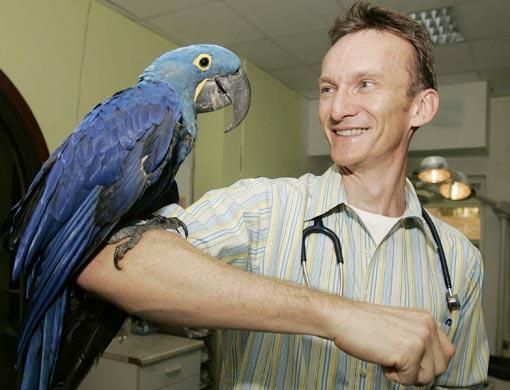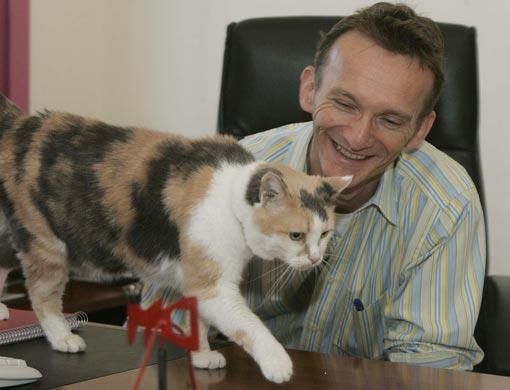Martin Wyness was one of the first veterinary doctors in the UAE. His business has more than quadrupled in size since he arrived, but he still carries the same concerns about animal welfare.
Dr Martin Wyness is not just a pioneering veterinarian in the UAE, but a passionate animal rights advocate and educator.
In a few short years after he graduated, he had the opportunity to treat pets, farm and zoo animals, sea mammals and reptiles. He treated animals both in their natural habitat and those in captivity.
Driven by the pursuit of knowledge in his field, he travelled as far as China to learn ancient and modern medical techniques, and to aid in the local efforts to save pandas from extinction.
Then he decided to return to the UK, but the prospect
of sun, travel and the pursuit of new knowledge and experiences brought him to the UAE in 1988. He started the second veterinary clinic in Dubai and the first veterinary clinic in Abu Dhabi.
Dr Martin spends much of his time educating the public on everything from how to take proper care of their pets to how to do their part to end animal cruelty. He is particularly passionate about protecting dolphins and endangered species.
In essence, his message is that humans can live in harmony with other species, but must have the knowledge, the will and the motivation to do so. In his words, "We are the custodians of our planet. We need to learn to observe without disturbing, and to accept that wildlife need not be captured and confined for human amusement."
I
I find it extremely cruel that people leave animals locked up alone in a villa or flat and leave the country. Animal cruelty is an issue everywhere in the world. When Jeremy Bentham, English utilitarian philosopher and social reformer, was asked how we should think with regard to the treatment of animals, he said: "The question is not 'Can they reason?' nor 'Can they talk?' but 'Can they suffer?'"
There is a fair portion of the population that doesn't understand animal welfare. I would like to create
a culture of animal care.
I want to spread awareness amongst people who would buy an exotic pet as a novelty, and then when it grows and becomes unmanageable, they leave it with a vet or confine it to a cage. I would like to prevent the purchase before it occurs, and put an end to the exotic animal trafficking business.
Me
Me and my upbringing.
I was born in 1961 in Aberdeen and never grew out of the desire to be a vet. Like most kids, I was drawn to animals. All my student life, I loved and was good at science. It was a very easy person-career match. I knew I didn't want a daily office job.
Veterinary medicine has a broad scope as well. Other human medical careers, in my view, were not as interesting.
In veterinary medicine, I can operate on a broken leg on the same afternoon that I see the animal and watch it heal. That being said, the veterinary profession is starting to become more specialised.
Me learning the ropes
If I didn't study veterinary, I would have decided on law school. I knew they are complete opposites, but I also had an interest in debate; law was a good second choice. I graduated from Glasgow University in Scotland in 1983. It was a great vet school. After earning qualifications in vet medicine, I could treat seven species. But if the clinic was busy, I would gain experience treating other species.
My first role as a vet was in the UK. I was very fortunate to work for a great practice called Bythman and Partners, located in the north of England in Newcastle. I worked as associate vet in a very busy practice.
It exposed me to all aspects of veterinary medicine, from farming to racehorses to pit ponies who live three miles under the North Sea.
In Victorian times pit ponies were employed in underground mines and are still in use today. The welfare of these animals is ferociously guarded by the miners.
Me and pro bono work
In the UK, the introduction of pet insurance has done wonders for the treatment of animals. You can get pet insurance in the UAE, although it is not that common here. As a vet, I believe pet insurance leads to better care for animals as a whole.
Most vets do pro bono work. You love animals and don't want to see them suffer. It is a very labour-intensive profession – one that includes lots of hands-on input.
Me and my travels
I went to Australia in 1986, and travelled around on a motorbike. I worked as a vet in some places and worked in clubs in others.
I would stay in each place for a few weeks then move on. I worked in Sydney, Adelaide and Port Lincoln, and then for a year as a vet in New Zealand. I transported racehorses to Hong Kong and then went to China in 1988.
Me and Chinese medicine
I landed in Shanghai, met a few vets and expressed interest in working at the Panda Reserve. The Chinese scientists were doing pioneering research on panda breeding, and coming up with solutions to help the species that was critically endangered.
There are many endangered species in China and the world over. We are losing species at an amazing rate. It is a result of human activity that could be altered if there is a will.
When I arrived in China, the vets and officials were very welcoming and enthusiastic to get to know this tall, lean, white person. They were also keen to learn and practise English.
I visited the vet school there, and learned valuable Chinese therapies. After travelling for three or four years, I decided to take a proper job so went back to England. I was immediately employed in a poorly run practice. It was a temporary position that I finished with relief.
Me and my responsibility as an educator
Most of the teaching I do is in the consultation room. Often, you will have a couple where one person is happy with pets and the other isn't.
I try to dispel myths, banish fears and consult on the care of the animals. For example, there is the 'toxoplasmosis myth'. People think that if they keep a cat it affects fertility. That is a myth. The fact is that people raised with cats have less chance of developing allergies or illnesses. (Most people get toxoplasmosis from undercooked food.)
To develop a proper immune system, children need exposure to pathogens. Flu, head lice and other nasty diseases are from interaction with other humans, not from other species.
Different species get diseases from themselves. This is the message I try to get across. Many think that dogs are dirty and carry diseases. The fact is that their saliva doesn't carry as many germs as human saliva.
Me and Dubai
Later in 1988, while reading the Veterinary Record, I discovered an interesting opportunity in Dubai. At the time, Dubai had only one veterinary surgeon. I expressed interest in the position and was offered an opportunity to open and run Dubai's second veterinary clinic – Jumeirah Veterinary Clinic.
The core work in Dubai was no different than anywhere else. It involved mainly typical pet work like in Australia and UK.
I love Dubai. It is the place I met my wife Claire. (She was working for Estée Lauder at the time.) And our two children, Kallum, 14, and Conner, 13, were born in Abu Dhabi.
Me and The British Veterinary Centre in Abu Dhabi
I enjoyed running the clinic in Dubai, but in the end, it wasn't my business, and my ultimate goal was to run my own clinic, which resulted in me setting up The British Veterinary Centre in 1991.
We started the clinic unofficially. We had no money. We simply talked to people who had animals, and the clientele here was extremely supportive of the idea.
The response was overwhelming and we outgrew our first office very quickly. That's when we moved to open the clinic in half our villa. That allowed us to build in more services, treat more pets and hire more staff. Now the clinic runs in two villas. We have outgrown this as well, but with the current prices in property it isn't that easy to expand.
Myself
What are your thoughts about the trade in exotic species?
There were chimps for sale in a souk once. They shouldn't be there. Chimps are not cuddly pets. They have social needs and a particular diet. To deny them this is detrimental to both the chimp and the owner. Another person bought a baboon once. When large animals grow and they are no longer cute, they are confined to a small cage.
Their lives then take a turn for the worse. They cannot survive in their natural habitat or integrate into a zoo.













